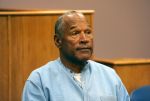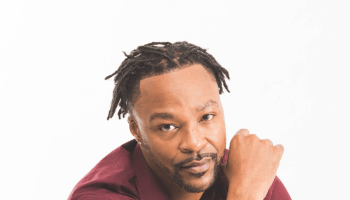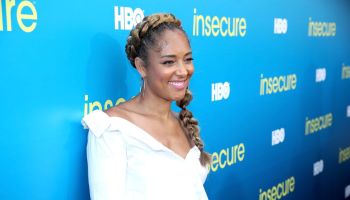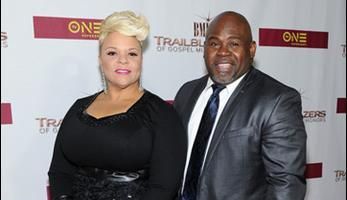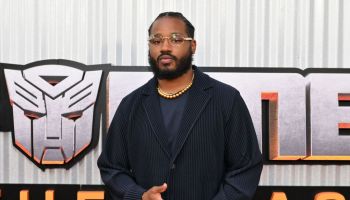Source From http://www.blackvoices.com/
While many child stars experienced ups and downs during their careers, particularly as they got older, some were able to escape scrutiny and flourish into successful adult actors.
Known to many as Tootie from the 1980s NBC sitcom ‘The Facts of Life‘ or Regine Hunter from Fox’s 1990s sitcom ‘Living Single,’ Kim Fields has transitioned from beloved actress to working director. Her directorial projects include multiple episodes on ‘Tyler Perry’s Meet the Browns‘ and ‘Tyler Perry’s House of Payne.’
As the daughter of actress and director Chip Fields (‘Good Times’) and the older sister of actress Alexis Fields (‘Moesha’), the New York native used her degree from Pepperdine University to place herself in a position behind the camera and learn the craft that many women aren’t recognized for.
Black Voices: You’ve been around a number of years and have done a number of projects. What’s going on with you now?
Kim Fields: A couple of different things. I’m currently the host for ‘Lens on Talent,’ which is BET and Johnson & Johnson’s filmmaker show. I’m really so excited about the show and the guests we had on, from Lisa Cortez, the Oscar-nominated producer for ‘Precious,’ to Roger Bobb, who is the executive president of Tyler Perry Studios to Tamir Mohammad from Tribeca Film Institute. There’s a really well-rounded group of people this year lending their wisdom and experiences and expertise to the show. Just because this is a specific industry, there are certain things that are universal. If you’re a new mom and you work in corporate America or retail or the filmmaking world, you’re still a new mom at the end of the day. There are certain things people can relate to even if they’re not sharing the same industry experiences. In tandem with that, I also direct here in Atlanta on Tyler Perry’s ‘Meet the Browns.’
BV: Did you ever think you would do this sort of work when you first started out in this business?
KF: Maybe not when I first started because I was 7 or 8 years old. I thought I was going to be a marine biologist. I think as I got a little bit older, being around crews and sets… I always said I was a crew baby, so I always liked sitting by the cameras and learning from the camera people about shots, framing and things of that nature. Talking to the lighting director about different looks with the lighting. I got my start professionally back in ’94 after being really dissatisfied as an actor and an audience member, and seeing if I could contribute in another way.
Black Voices: You’ve been around a number of years and have done a number of projects. What’s going on with you now?
Kim Fields: A couple of different things. I’m currently the host for ‘Lens on Talent,’ which is BET and Johnson & Johnson’s filmmaker show. I’m really so excited about the show and the guests we had on, from Lisa Cortez, the Oscar-nominated producer for ‘Precious,’ to Roger Bobb, who is the executive president of Tyler Perry Studios to Tamir Mohammad from Tribeca Film Institute. There’s a really well-rounded group of people this year lending their wisdom and experiences and expertise to the show. Just because this is a specific industry, there are certain things that are universal. If you’re a new mom and you work in corporate America or retail or the filmmaking world, you’re still a new mom at the end of the day. There are certain things people can relate to even if they’re not sharing the same industry experiences. In tandem with that, I also direct here in Atlanta on Tyler Perry’s ‘Meet the Browns.’
BV: Did you ever think you would do this sort of work when you first started out in this business?
KF: Maybe not when I first started because I was 7 or 8 years old. I thought I was going to be a marine biologist. I think as I got a little bit older, being around crews and sets… I always said I was a crew baby, so I always liked sitting by the cameras and learning from the camera people about shots, framing and things of that nature. Talking to the lighting director about different looks with the lighting. I got my start professionally back in ’94 after being really dissatisfied as an actor and an audience member, and seeing if I could contribute in another way.
BV: What’s it like working with Tyler Perry and doing more than 100 shows?
KF: Well, it’s really a blessing I don’t take it for granted. Everything that Tyler does, these are his babies, and to be entrusted with that, I don’t take that lightly at all. Because he’s got a very specific eye, specific tastes, he’s got a formula and he knows what works and is in a number of ways a genius. At the same time, he lets me know unequivocally that he respects my eye and my tastes and wants to marry the two. It’s certainly a blessing to go to a studio where the person built it from the ground up. It’s a different feeling from going to Warner Bros. or Sony. To be able to contribute in this way and have that one-on-one exposure. I guess it would be like the old days of the studio system, where the stars could talk to Louis B. Mayor and Jack Warner. It’s fun and fascinating.
BV: You signed a first-look deal with the Gospel Music Channel. What are they looking for you to contribute?
KF: The thing that excited me about the GMC is dealing with a faith-based audience, something you do get to explore with Tyler. Right now the opening stages at Tyler’s studios are driven by Tyler’s vision. This outlet gives me the opportunity to create from scratch. I’m so in love with doing projects for a faith-based community, not solely. I don’t want to give my career to that audience. I think it’s still important in the story you tell to uplift as you entertain, especially for women. I’m so over reality and housewives and bad women and bad girls.
BV: As part of two successful series, when people see you these days what do they associate you with, Tootie or Regine?
KF: Really just Kim Fields, the brand, and that’s a blessing I don’t take for granted. The first reaction seems to be, “Oh my gosh, you’re Kim Fields.” Sometimes it’s ‘Meet the Browns.’ People really know I do that show. Sometimes it’s people saying, “I grew up with you. We still watch ‘Living Single.'” Sometimes it’s from the poetry standpoint, what I’ve done as a spoken word artist. It really varies. It’s a constant reminder to me of the gifts and talents I’ve been blessed with.
BV: Any thoughts about coming back on the screen as an actress, even if it’s in a comedy or a drama?
KF: Very much so. Me and Tyler have talked about it, the president of the studio, GMC, and I have talked about it. At this point, I’m looking for projects that challenge me as an actor. I’ve been blessed to be in the industry for so long and yet there’s so much that I haven’t done, different characters to portray and genres I’ve barely scratched the surface on. I’m certainly in love with content that’s on the Web. It may be a matter of something online first. I recognize that I’m certainly not in the driver’s seat. A friend of mine told me that several years ago. “You just sit in the passenger seat,” she said. “And keep your seat belt on and let God drive you where he’s driving you on the road he mapped out. Keep quiet; he doesn’t need direction from you.”
BV: What keeps you passionate about doing this?
KF: God has kept that alive in me — as an actor and a director and as a member of the entertainment community. Aside from that, mortgage bills will certainly motivate you to get up in the morning and then my family. I have the most amazing family in the world with my husband, Christopher, and my son, Sebastian. They’re so extraordinarily supportive of what I do. My mother, of course, my sister… everyone. Everyone that has been part of the village it takes to raise this child and turn her into a woman. I couldn’t fathom my life without them.
BV: Everyone in your family is in the business. Have you ever thought about putting a project together that they can all be a part of?
KF: We want to stay in love with each other as family members, so probably not, no. Every time we talk about it, we’re like “no.”
BV: ‘Living Single’ had a good long run on a major network. Why aren’t we getting that winning formula on today’s television?
KF: I don’t know. I think you have people very much living in fear of losing their jobs. They want to go with what’s safe. They want to go with what they know, so you get a lot of regurgitation and then that sense of, “We don’t know an audience that wants to see it.” It’s total crap at the end of the day. Pardon me for being so crass, but it’s total crap. Why would the show be so popular in syndication long after the show was shot? It’s all right. It’s making it easier for me to establish that work.


